
Campaign finance, also known as election finance or political donations, refers to the funds raised to promote candidates, political parties, or policy initiatives and referenda. Political parties, charitable organizations, and political action committees are vehicles used for fundraising for political purposes. "Political finance" is also popular terminology, and is used internationally for its comprehensiveness. Political donations can also refer to funds received by political parties from private sources for general administrative purposes.
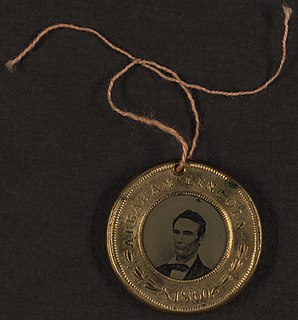
A political campaign is an organized effort which seeks to influence the decision making progress within a specific group. In democracies, political campaigns often refer to electoral campaigns, by which representatives are chosen or referendums are decided. In modern politics, the most high-profile political campaigns are focused on general elections and candidates for head of state or head of government, often a president or prime minister.

Fundraising or fund-raising is the process of seeking and gathering voluntary financial contributions by engaging individuals, businesses, charitable foundations, or governmental agencies. Although fundraising typically refers to efforts to gather money for non-profit organizations, it is sometimes used to refer to the identification and solicitation of investors or other sources of capital for for-profit enterprises.
The "Stand By Your Ad" provision (SBYA) of the Bipartisan Campaign Reform Act, enacted in 2002, requires candidates in the United States for federal political office, as well as interest groups and political parties supporting or opposing a candidate, to include in political advertisements on television and radio "a statement by the candidate that identifies the candidate and states that the candidate has approved the communication". The provision was intended to force political candidates running any campaign for office in the United States to associate themselves with their television and radio advertising, thereby discouraging them from making controversial claims or attack ads.
A publicly funded election is an election which is funded with money collected through taxes. Jurisdictions such as United Kingdom, Norway, India, Russia, Brazil, Nigeria, and Sweden have considered legislation that would create publicly funded elections.
Matching funds are funds that are set to be paid in proportion to funds available from other sources. Matching fund payments usually arise in situations of charity or public good. The terms cost sharing, in-kind, and matching can be used interchangeably but refer to different types of donations.
Campaign finance in the United States is the financing of electoral campaigns at the federal, state, and local levels. At the federal level, campaign finance law is enacted by Congress and enforced by the Federal Election Commission (FEC), an independent federal agency. Although most campaign spending is privately financed, public financing is available for qualifying candidates for President of the United States during both the primaries and the general election. Eligibility requirements must be fulfilled to qualify for a government subsidy, and those that do accept government funding are usually subject to spending limits on money.
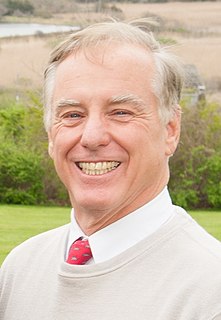
Howard Brush Dean III is an American physician, author, lobbyist, and retired politician who served as governor of Vermont from 1991 to 2003 and chair of the Democratic National Committee (DNC) from 2005 to 2009. Dean was a candidate for the Democratic nomination in the 2004 presidential election. His implementation of the fifty-state strategy as head of the DNC is credited with the Democratic victories in the 2006 and 2008 elections. Afterward, he became a political commentator and consultant to McKenna Long & Aldridge, a law and lobbying firm.
The presidential election campaign fund checkoff appears on US income tax return forms as the question Do you want $3 of your federal tax to go to the Presidential Election Campaign Fund?

The 2008 presidential campaign of Ron Paul, Congressman of Texas, began in early 2007 when he announced his candidacy for the 2008 Republican nomination for President of the United States. Initial opinion polls during the first three quarters of 2007 showed Paul consistently receiving support from 3% or less of those polled. In 2008, Paul's support among Republican voters remained in the single digits, and well behind front-runner John McCain.
In the 2008 United States presidential election, fundraising increased significantly compared to the levels achieved in previous presidential elections.
Electoral reform in the United States refers to efforts to change American elections and the electoral system used in the United States.
Moneybomb is a neologism coined in 2007 to describe a grassroots fundraising effort over a brief fixed time period, usually to support a candidate for election by dramatically increasing, concentrating, and publicizing fundraising activity during a specific hour or day. The term was coined by Trevor Lyman to describe a massive coordinated online donation drive on behalf of presidential candidate Ron Paul, in which context the San Jose Mercury News described a moneybomb as being "a one-day fundraising frenzy". The effort combines traditional and Internet-based fundraising appeals focusing especially on viral advertising through online vehicles such as YouTube, Twitter, and online forums. In the case of lesser-known candidates it is also intended to generate significant free mass media coverage the candidate would otherwise not receive. Moneybombs have been used for grassroots fundraising and viral activism over the Internet by several 2008 presidential candidates in the United States. It emerged as an important grassroots tool leading up to the 2010 midterm elections and 2012 presidential election in the United States.
Grassroots fundraising is a common fundraising method used by political candidates, which has grown in popularity with the emergence of the Internet and its use by US presidential candidates like Howard Dean, Barack Obama, Ron Paul, and most recently Bernie Sanders. Grassroots fundraising is a way of financing their campaigns for candidates who don't have significant media exposure of front runner status, or who are perhaps in opposition to the powerful lobby groups which influence the political party nominating process. It often involves mobilizing grassroots support to meet a specific fundraising goal or sets a specific day for grassroots supporters to donate to the campaign. Grassroots fundraising can also be a method for organizations to get as many people as possible to give and strategically get people involved. This method encompasses the efforts to reach out to the community being served and gaining connections and resources for one's campaign.
Trevor Morris Lyman is an American musician and internet music entrepreneur. Lyman popularized such political campaign concepts as moneybombs and dedicated political blimp advertising. He helped organize grassroots fundraising for 2008 United States Republican presidential candidate Ron Paul, Congressman from Texas by offering to create a hub website after supporters of the candidate decided a "money bomb" would be an effective way to bring in campaign donations.
Mobile donating refers to donating using a mobile device. Mobile donating is primarily done through an SMS or a phone call.
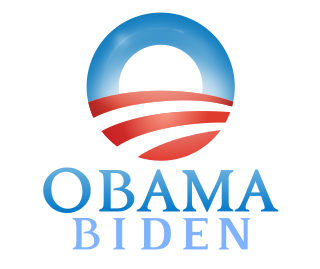
The 2008 presidential campaign of Barack Obama, then junior United States senator from Illinois, was announced on February 10, 2007, in Springfield, Illinois. After winning a majority of delegates in the Democratic primaries of 2008, on August 23, leading up to the convention, the campaign announced that Senator Joe Biden of Delaware would be the vice presidential nominee. At the 2008 Democratic National Convention on August 27, Barack Obama was formally selected as the Democratic Party nominee for President of the United States in 2008. He was the first African American in history to be nominated on a major party ticket.
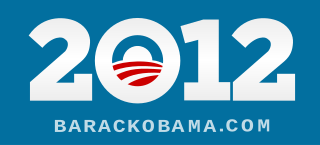
The 2012 presidential campaign of Barack Obama, the 44th President of the United States, announced his candidacy for re-election as president on April 4, 2011. On September 5, 2012, he again became the nominee of the Democratic Party for the 2012 presidential election. Along with his running mate, Vice President Joe Biden, Barack Obama was opposed in the general election by former Massachusetts Governor Mitt Romney, along with various minor candidates from other parties. The election took place on Tuesday, November 6, 2012.
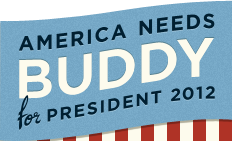
The 2012 presidential campaign of Buddy Roemer, 52nd Governor of Louisiana and former U.S. Representative of Louisiana began as a movement for the 2012 Republican Party nomination for President of the United States shortly following the 2010 midterm elections. After his exclusion from every nationally-televised Republican debate, Roemer announced on February 22, 2012 that he would instead pursue a place on a third-party ticket, specifically the Reform Party and Americans Elect nominations. Shortly after Americans Elect announced they would not be fielding a candidate, Roemer's campaign announced on May 31, 2012 that he was ending his 2012 presidential campaign altogether.

The Hillary Victory Fund was a joint fundraising committee for Hillary for America, the Democratic National Committee (DNC), and 33 state Democratic committees. As of May 2016, the Fund had raised $61 million in donations.









